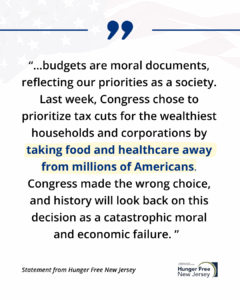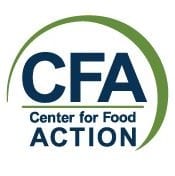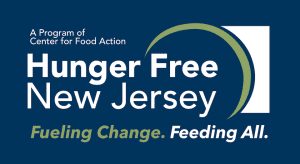Funding in a 2024 Senate appropriations bill for the Special Supplemental Nutrition Program for Women, Infants, and Children (WIC) falls far short of what is needed to provide all eligible families who apply with the full nutrition assistance benefit. WIC is a highly effective program that provides a science-based package of nutritious foods and nutrition education, breastfeeding support, and other services to millions of families with low incomes.
Without substantial funding above what is in the Senate bill, we estimate that 600,000 eligible new parents and young children would be turned away from WIC, including 14,100 in New Jersey. Under a funding shortfall, states would put some eligible applicants on waiting lists and would be unable to continue serving some participants when they reach the end of their eligibility period and need to renew their benefits. States could also reduce enrollment by scaling back outreach, clinic hours, or enrollment simplification efforts. Some eligible families who otherwise would have sought benefits could be discouraged from applying at all when they learn about waitlists.
WIC funding is set in the Agriculture appropriations bill. The Senate is slated to consider this bill this week along with two others — Military Construction and Veterans Affairs and the Transportation, Housing and Urban Development funding bills — in combined legislation known as a “minibus.” All three bills passed out of the Appropriations Committee with strong bipartisan support.
Senator Murray, the chair of the Appropriations Committee and a long-standing champion of WIC, has recognized that the WIC funding in the bill is inadequate and committed to fighting to fully fund WIC. Last Friday after the minibus was unveiled she tweeted, “I will fight tooth and nail to make sure no one loses their WIC benefits or is put on a waitlist. Making sure families across the country with the tightest budgets can put food on the table is not just the right thing to do, it’s an investment in these families’ futures.”
Failing to adequately fund WIC would be unprecedented in recent memory. In recognition of WIC’s proven track record of positive impacts for health and developmental outcomes, for more than 25 years there has been a bipartisan commitment to provide enough funding to serve every eligible family who applies or renews their benefits. While it is disappointing that the Senate is moving forward with a bill that shortchanges WIC, it’s most critical that Congress ultimately meets the 25-year commitment and provides the necessary resources for WIC in final funding legislation.
If Congress fails to adequately fund WIC, then under WIC’s prioritization criteria the people turned away would primarily be new parents, toddlers, and preschoolers. They would miss out on the healthy foods and vital services WIC provides. Increasing food insecurity during a critical window for maternal health and child development could have lasting health consequences.
Here’s an example of how states would have to turn people away from the program: a low-income woman who enrolled in WIC during her pregnancy would need to recertify after giving birth to continue participating. If there is a funding shortfall, even though her baby could be enrolled, she might have to be put on a waiting list instead of continuing to receive WIC benefits and services. That means that in addition to losing out on milk, eggs, cereal, and other foods with nutrients she needs, she’d no longer receive $44 per month to buy fruits and vegetables through a benefit that was increased two years ago on the recommendation of the National Academies of Sciences, Engineering and Medicine.
The Senate bill includes $6.3 billion for WIC, the funding level requested in the President’s budget. When the President’s budget was developed, this was expected to be enough to provide all eligible applicants with the full science-based benefit. However, it has since become clear that this amount is inadequate because participation and food costs have risen more than anticipated.
For example, the most recent data from the Department of Agriculture show that WIC participation in the first quarter of fiscal year 2023 was 3.2 percent higher than the first quarter of 2022; since then it has been 5.7 percent higher than the same period in 2022. This is good news — too many eligible families don’t participate in WIC, and rising participation is evidence that policies to make it simpler for families to enroll and maintain eligibility are starting to work.
While we previously estimated that the funding level provided in the Senate bill would result in 700,000 to 800,000 eligible people being turned away from WIC next year, we have revised our estimates in light of the latest program data and recent action by the Biden Administration to mitigate the funding shortfall. Agriculture Secretary Tom Vilsack recently used a long-standing authority to use other USDA resources, which would otherwise have gone unused, to bolster WIC funding.
This transfer is an important first step to narrow the funding gap, but it is not sufficient to avoid turning away eligible applicants and reapplicants. Underscoring the need for further congressional action, the Administration recently requested that $1.4 billion in emergency funding for WIC be included in a short-term continuing resolution, which will be needed by the end of September to avoid a lapse in appropriations that would lead to a government “shutdown.”
Taking the transfer into account, the Administration’s request suggests that Congress needs to provide WIC with $7.1 billion in total funding for 2024. While that estimate could change as the appropriations process unfolds and more data become available, it is the basis for our estimates of how many people would be turned away under the Senate bill’s funding level of $6.3 billion.
Our nation has the resources to provide our youngest children and their parents with the healthy food they need to thrive. As the appropriations process moves forward, Congress must sustain its long-standing commitment and provide the funding necessary to ensure WIC can provide the full benefit to every eligible family who wants to participate.
To read more, click here.






